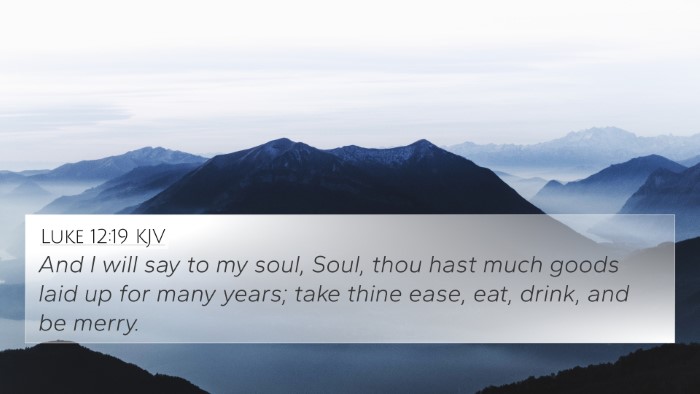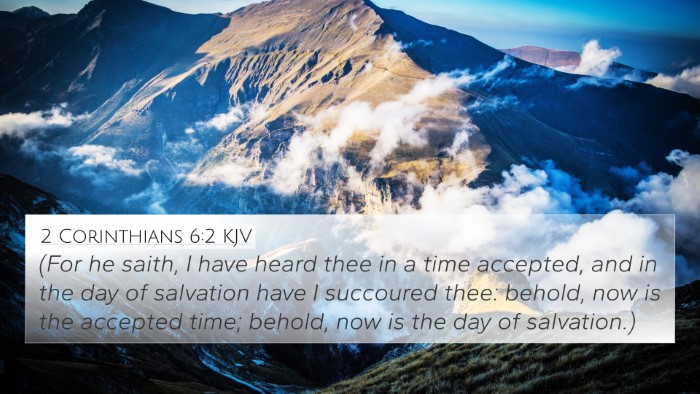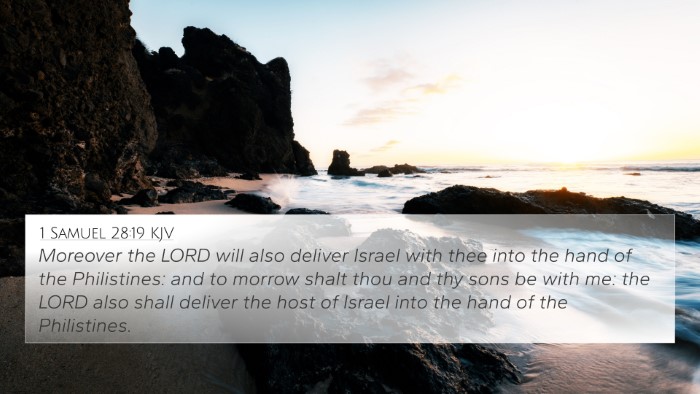Understanding Proverbs 27:1
Bible Verse: Proverbs 27:1 - "Do not boast about tomorrow, for you do not know what a day may bring."
Meaning and Interpretation
This verse warns against the presumption of control over the future. It highlights the uncertainty of life and encourages humility. The core message is about the importance of living in the present and recognizing the limitations of human foresight.
Insights from Public Domain Commentaries
Matthew Henry's Commentary
Matthew Henry emphasizes the importance of relying on God rather than on our own understanding or predictions of the future. He notes that boasting about tomorrow is foolish since we cannot predict the trials or blessings that await us.
Albert Barnes' Commentary
Albert Barnes elaborates on the idea that tomorrow is not guaranteed. He underscores the necessity for humility and the acknowledgment of our limitations in knowledge. Barnes points out that this verse serves as a reminder to be grateful for the present and to prepare spiritually rather than materially for the future.
Adam Clarke's Commentary
Adam Clarke provides insights about the nature of uncertainty in human life. He argues that the future belongs only to God, and humans should focus more on the present duties and responsibilities rather than worrying about what may occur tomorrow.
Cross-References to Proverbs 27:1
- James 4:13-14: "Now listen, you who say, 'Today or tomorrow we will go to this or that city, spend a year there, carry on business and make money.' Why, you do not even know what will happen tomorrow." - This verse reflects similar themes of uncertainty about the future.
- Psalms 39:5: "You have made my days a mere handbreadth; the span of my years is as nothing before you. Everyone is but a breath, even those who seem secure." - Acknowledges the brevity of life and the uncertainty that comes with each day.
- Proverbs 16:9: "In their hearts, humans plan their course, but the Lord establishes their steps." - Reinforces the idea that while we may make plans, it is ultimately God who guides our paths.
- Lamentations 3:25-26: "The Lord is good to those whose hope is in him, to the one who seeks him; it is good to wait quietly for the salvation of the Lord." - Suggests that patience and faith are vital in the face of uncertainty.
- Ecclesiastes 3:1-2: "There is a time for everything, and a season for every activity under the heavens." - Emphasizes the importance of recognizing the present moment.
- Matthew 6:34: "Therefore do not worry about tomorrow, for tomorrow will worry about itself. Each day has enough trouble of its own." - This verse explicitly shares the message of focusing on today instead of worrying about the future.
- Proverbs 21:30: "There is no wisdom, no insight, no plan that can succeed against the Lord." - Highlights the futility of human plans in light of divine sovereignty.
Thematic Connections
Proverbs 27:1 unveils a deep theological truth about the ephemerality of human life and the control that God maintains over our circumstances. It aligns closely with several key themes in scripture:
- Human Vulnerability: Throughout scripture, human beings are reminded of their frailty and lack of control compared to God’s omnipotence.
- Trust in God: Many verses encourage reliance on God, reinforcing that He holds the future in His hands.
- Living in the Present: The call to be mindful of today’s responsibilities rather than being preoccupied with tomorrow is echoed in various texts.
Conclusion
Proverbs 27:1 serves as a powerful reminder to acknowledge our limitations and to trust in the Lord for guidance in our lives. The echoes of this message resonate throughout both the Old and New Testaments, illustrating the timeless wisdom contained within scripture. Understanding connections between Bible verses, such as those detailed above, offers a richer comprehension of God's Word and its application in our daily lives.
Further Study and Resources
For those interested in delving deeper into the cross-references and thematic connections of scripture, several tools can enhance your study:
- Bible Concordance: A useful resource for finding specific words and themes.
- Bible Cross-Reference Guide: Helps in linking verses that relate to each other.
- Cross-Referencing Bible Study Methods: Various techniques can be employed for a comprehensive understanding of scripture.
- Bible Chain References: A method to connect verses in a thematic chain.
- Tools for Bible Cross-Referencing: Various online and print resources available for deeper study.
The exploration of these cross-references enriches the understanding of Biblical texts and fosters a profound appreciation for the interconnectedness of scripture.








